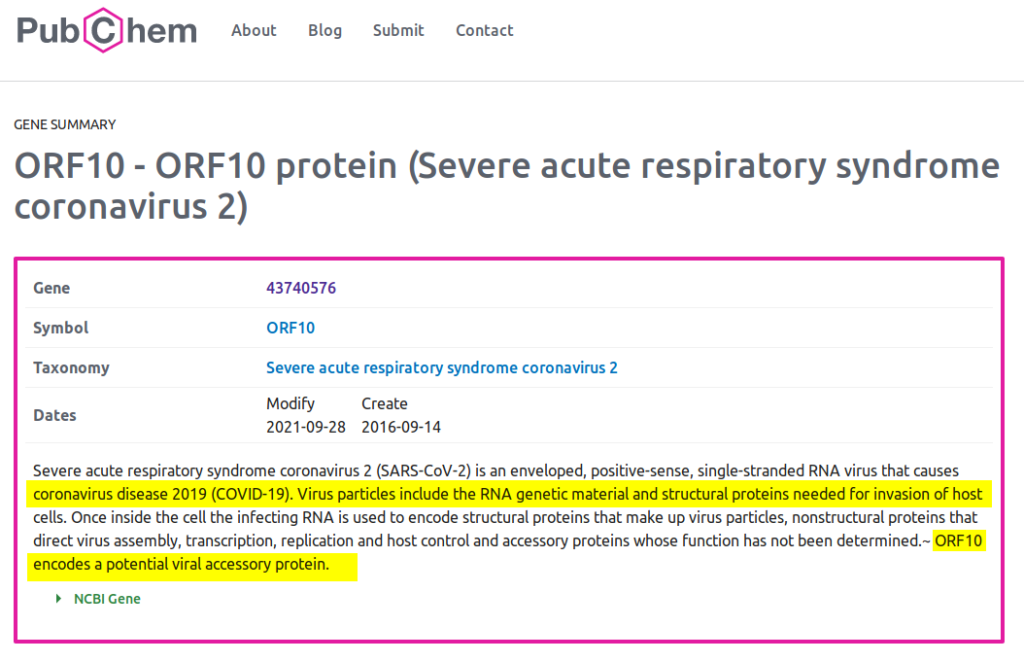Herpes Virus Bioengineered into SARS-CoV-2 & Pfizer–BioNTech and Moderna COVID-19 mRNA vaccines
Thu 3:30 pm +00:00, 9 Dec 2021 2Herpes virus ORF10 protein encoded in SARS-CoV-2 and in Pfizer–BioNTech and Moderna COVID-19 mRNA vaccines cause of all new cases of COVID-19
NCIO

Within SARS-CoV-2 and COVID-19 mRNA vaccines is a protein called ORF10 protein. Studies have concluded that ORF10 acts as a precursor of additional RNAs in roles concerning gene expression, controlling cellular antiviral pathways, or within viral replication (Taiaroa et al., 2020). ORF10 of SARS-CoV-2 is the last predicted coding sequence upstream of the poly-A tail and is the shortest predicted coding sequence, composed of 38 a.a. (Taiaroa et al., 2020). ORF10 is predicted to harbor a long helix and a pair of ϐ-strands. ORF10 is not found within the SARS-CoV-1 proteome (Taiaroa et al., 2020). ORF10 is the only protein that is present exclusively/only in SARS-CoV-2 and not in SARS-CoV or any other human coronaviruses.
The WHO reported that the severity of COVID-19 is enhanced by the ORF10 protein. “These findings of uniqueness of ORF10 and predicted intrinsic characteristics support possible involvement of ORF10 protein in giving COVID-19 its specific characteristics like spread and virulence.” World Heath Organization
Virulence is a pathogen’s or microorganism’s ability to cause damage to a host. In most contexts virulence refers to the degree of damage caused by a microbe to its host. The pathogenicity of an organism — its ability to cause disease — is determined by its virulence factors.
These results indicate that ORF10, like its HSV-1 homolog VP16, is a transactivating protein despite the absence of sequences similar to the VP16 carboxy-terminal domain. The transactivating function of the ORF10 tegument protein may be critical for efficient initiation of viral infection.
1993 Journal of Virology published study
We conclude that ORF10 protein is required for efficient virion assembly and is a specific determinant of virulence in epidermal and dermal cells in vivo. … ORF10 protein has some, but not all, of the properties of HSV-1 VP16. … In summary, these experiments show that ORF10 protein is required for efficient viral replication, virion formation, and cell-cell spread in human.
2006 Journal of Virology published study
Nuclear export of host mRNAs is critical for proper cellular functions and survival. To mitigate this effort, viruses have evolved multiple strategies to inhibit this process. Distinct to the generally nonselective inhibition mechanisms, ORF10 from gammaherpesviruses blocks nuclear export of selective mRNAs by forming a complex with Rae1 (RNA export 1) and Nup98 (nucleoporin 98).
October 8, 2020 published research article – Molecular mechanism underlying selective inhibition of mRNA nuclear export by herpesvirus protein ORF10
Viruses have evolved multiplemechanisms to inhibit cellular gene expression, thereby impeding host antiviral responses. Gong et al. identify a herpesvirus protein, ORF10, of KSHV that blocks nuclear export of selective mRNAs by interacting with an RNA export factor, Rae1. This interaction of ORF10 is critical for optimal KSHV replication.
We report that ORF10 inhibits mRNA export in a transcript-selective manner to control cellular gene expression. Nuclear export inhibition by ORF10 requires an interaction with an RNA export factor, Rae1. Genome wide analysis reveals a subset of cellular mRNAs whose nuclear export is blocked by ORF10 with the 3’UTRs of ORF10 targeted transcripts conferring sensitivity to export inhibition. The ORF10-Rae1 interaction is important for the virus to express viral genes and produce infectious virions.
2016 study “A Herpesvirus Protein Selectively Inhibits Cellular mRNA Nuclear Export“
It is important to note that all viruses and virus proteins must have a unique nomenclature (name). “Consistent protein nomenclature is indispensable for communication, literature searching and entry retrieval. A good protein name is one which is unique, unambiguous, can be attributed to orthologs from other species and follows official gene nomenclature where applicable. The process of associating a name with a protein sequence has various components: sequence function identification/prediction, choosing a name and applying formatting.” International Protein Nomenclature Guidelines

ORF10 protein is a protein of the human herpes virus. Herpesviruses are large DNA viruses that have two distinct life cycle phases: lytic replication and latency. During lytic replication, they operate a highly regulated viral gene expression program, resulting in the production of infectious virions. Herpesviruses are known for manipulating cellular mRNA export machinery.
The COVID-19 mRNA vaccines contain both the herpes virus protein ORF10 and instructions to make spike proteins to give the herpes virus protein ORF10 the key/means to enter cells and make us sick.
“mRNA vaccines teach our cells how to make a protein—or even just a piece of a protein—that triggers an immune response inside our bodies…. COVID-19 mRNA vaccines give instructions for our cells to make what is called the ‘spike protein.’ The spike protein is found on the surface of the virus that causes COVID-19.” CDC
“Specifically, the vaccine contains the mRNA of what’s known as spike protein, which is located on the surface of the SARS-CoV-2 virus and is what it uses to invade host cells. The novel coronavirus uses spike protein like a key to gain entry to our cells; once inside, the virus is free to replicate, making us sick.” Carlos Malvestutto, MD, MPH, who specializes in infectious disease at The Ohio State University Wexner Medical Center
Germany (BioNTech vaccine) and the WHO chose to use the 2003 patented (patent US-2006257852-A1) herpes ORF10 protein encoded SARS-CoV-2 virus to ensure the novel coronavirus would reinfect (relapse) everyone who was vaccinated for years to come. There is currently no cure or preventive treatment for a herpes infection. If a person gets a herpes virus infection, they will have it for life , whether or not they experience symptoms – during the first herpes outbreak (called primary herpes), an infected person may experience flu-like symptoms. These include body aches, fever and headache.
#COVID-19, #mRNAvaccines, #vaccines, #BioNTech, #Moderna, #WHO, #SARS-CoV-2
















The herpes virus is carried by 95% of the human population, but there are several types. It requires a decline or collapse in the immune system to show symptoms. Equally when the immune system recovers the symptoms will go away in most people. The addition of the protein to this universal virus reduces the DNA’s ability to see of mRNA virus
attack. Judy Mikovits says that RNA needs to translate its viruses into DNA which it does using the enzyme Transcriptase. Transcriptase can be blocked through medical intervention making the RNA viruses unable to transfer to our DNA. The COVID 19 is a retrovirus which causes blood clots. You will get antibodies to it once it gets to DNA, and these will protect most people. As very few die of COVID except very old or very sick, it is best to get the illness whenever you can, as with flu. Once you’re through, you have natural immunity which is effective against most variants. vaccines are not. You can get an antibodies test which might be useful in refusing vaccines, as vaccines are more dangerous to people who’ve had COVID-19, and it is a recognised vaccine exemption in for example Germany.
Excellent comment and advice for getting an antibody test.